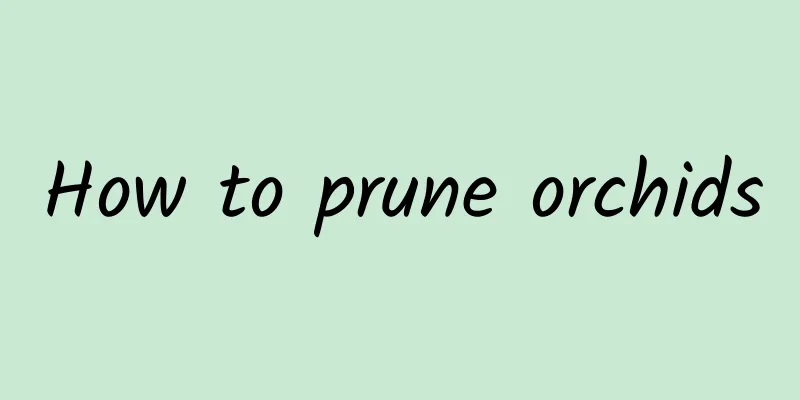How to prune orchids

When to prune orchidsIn fact, there is no fixed time for pruning orchids. As long as you see that the orchid has too many leaves, or old or dead leaves appear, you can prune them in time. For cuttings of orchid branches after pruning, you can cut a section of branches with nodes, about ten centimeters long, keep the leaves on it, then spray fungicides such as carbendazim on the wound for disinfection, and place the branches in a cool place to dry. Insert the branches directly into the prepared soil, then compact the soil with your hands, and then water it thoroughly. The purpose of this is to provide sufficient moisture for the plant's later growth. How to prune orchidsWhen you see that the orchid has too many leaves, you need to prune them in time, mainly pruning some weak and old leaves to allow healthy leaves more space to grow and ensure that the plant has a good ventilation environment. If you see that the orchid has branches and leaves that grow too high, you need to trim them in time and trim off the parts above the overly long branches and leaves. However, be careful not to trim them too short, otherwise it will affect the beauty of the plant. Orchid pruning makes it grow fasterIf you want the orchid to grow fast, you should also pay attention to the pruning of flower buds during its growth process. If the plant grows too many flower buds, you should cut them off. It is recommended to leave about 2 flower buds, and after the flowers bloom, the flower stems should be cut off in time. Orchid pruning and floweringIf you want the orchid to bloom, it also needs to be pruned properly. The old, dead and yellow leaves of the plant should be cut off. This not only allows ventilation but also reduces nutrient consumption. If you see that the tips of the orchid leaves are dry, they should also be cut off. Leaves damaged by pests and diseases should also be cut off to avoid infection. Orchid pruning precautionsThe roots of orchids are fleshy roots, which are very easy to rot if infected by bacteria. Therefore, when pruning the roots, you must pay attention to disinfecting the scissors. At the same time, you must also properly disinfect the roots to avoid wound infection. It is best to cut at an angle so that the wound is relatively flat. |
<<: Can an orange tree be planted outside your home?
>>: Can Zephyranthes be planted in the ground?
Recommend
What to do if the leaves of the fortune tree turn black
1. Adjust the temperature Reason: It may be becau...
When is the best time to plant cabbage?
Cabbage is a popular vegetable, especially in the...
Wild leek cultivation methods and precautions
1. Soil When growing wild leeks, you must choose ...
How often should I water Clivia in summer?
Frequency of watering Clivia in summer Clivia is ...
What is white frost on succulents?
1. Normal phenomenon The growth of white frost on...
What to do if the cactus has rotten roots and stems
Causes of cactus root and stem rot There are two ...
These 6 kinds of flowers can take root by pinching the root branches and putting them in water. It is difficult to keep them alive.
Cutting rooting Rose 1. When preparing branches f...
How to breed Rhododendron splendidum
1. Cutting There are seasonal restrictions for cu...
When is the best time to transplant peonies?
As a beautiful and elegant flower, peony has many...
Now, when you propagate these kinds of flowers by cuttings, they take root very quickly and grow so fast that you can’t stop!
Million Little Ling 1. Choose clean nutrient soil...
Common Pests of Teyu Lotus and Their Control Methods
Common pests of Teyulian: root-knot nematodes Roo...
Cultivation methods and precautions of ponkan
1. Maintenance methods 1. Soil: It needs to be pl...
Why is Mimosa shy? Pictures of Mimosa
1. Why is Mimosa shy? Mimosa closes its leaves wh...
What vegetables are suitable to grow in March?
In March, with the arrival of spring, the tempera...
What happens if you eat too many strawberries? Can pregnant women eat strawberries?
1. What happens if you eat too much? Strawberries...









